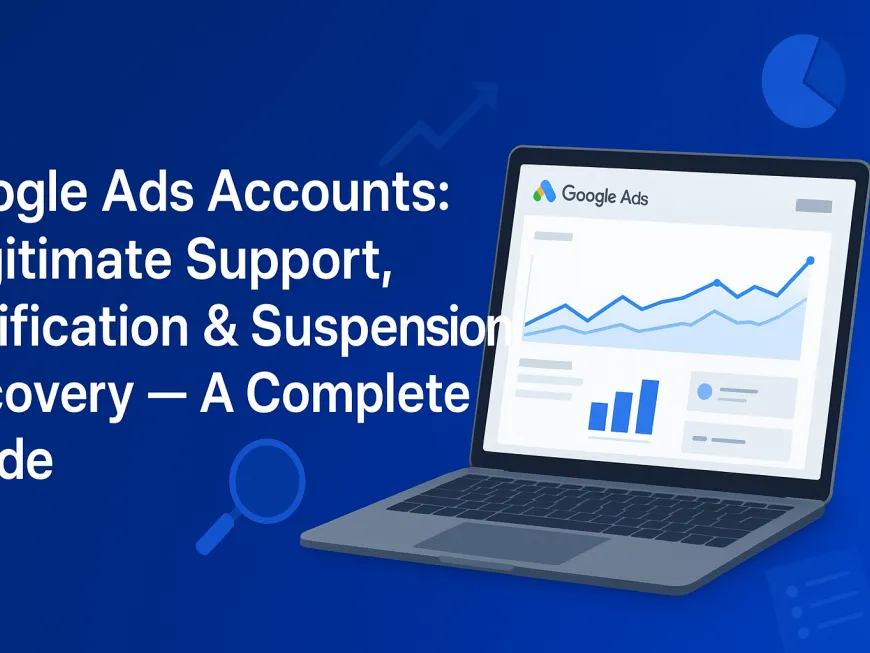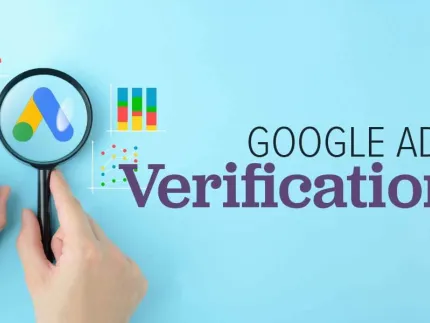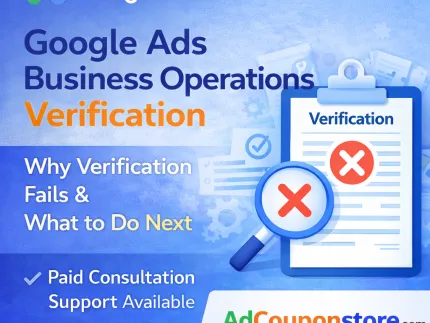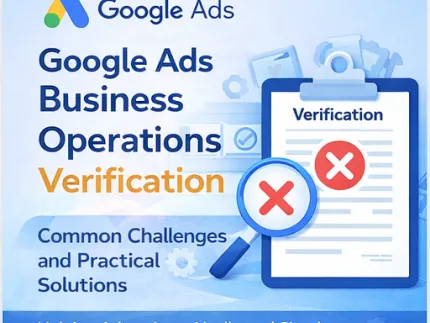
Running successful Google Ads campaigns starts with a healthy, compliant account. But many advertisers — freelancers, small businesses, agencies and creators — find themselves blocked by verification headaches, sudden suspensions, or payment problems. In this guide we explain the legitimate, policy-compliant services and support you should expect when seeking help for Google Ads accounts: from Business Operation Verification (BOV) to suspension appeals, payment fixes, and best practices to prevent problems before they start.
Why proper account setup and verification matter
Google’s advertising ecosystem is large and automated. To protect users, advertisers, and ad quality, Google enforces verification steps and policies that determine whether an account can run ads, use promo codes, or be eligible for certain ad formats. Proper setup and verification help:
-
Build trust with Google (reduces false positives)
-
Make accounts eligible for billing methods and promo codes
-
Avoid policy violations that can suspend campaigns
-
Ensure smoother ad delivery and higher performance
Businesses that treat verification as an afterthought often face delays, disapproved ads, or account suspensions — which are costly in lost traffic and reputation.
Legitimate services a compliance-first support provider should offer
If you hire a support provider, make sure they commit to lawful, Google-compliant practices. Here are the typical, legitimate services:
-
Account setup & configuration
-
Creating the Google Ads account with correct business details, billing profile, and time zone.
-
Proper linking to Google Merchant Center, Google Analytics, and Google Tag Manager as needed.
-
Setting up conversion tracking and campaign structure aligned with business goals.
-
-
Business Operation Verification (BOV) support
-
Guidance on documentation required for identity and business verification.
-
Preparing and organizing supporting documents (business registration, invoices, official ID) in the format Google accepts.
-
Walkthroughs for submitting verification requests via the Google Ads interface or Support channels.
-
-
Policy & compliance audits
-
Reviewing landing pages, ad copy, and business practices for policy risks (misleading content, prohibited products/services, unclear billing, etc.).
-
Remediation plans: what to change to meet policy (disclosures, landing page transparency, privacy practices).
-
-
Suspension diagnosis & appeal assistance
-
Investigating the specific suspension reason shown in the account (e.g., “Unacceptable business model,” “Circumventing systems,” or payment-related issues).
-
Drafting evidence-based appeal letters and organizing supporting documents.
-
Communicating with Google Support on behalf of clients when appropriate.
-
-
Payment troubleshooting
-
Resolving issues with suspicious payments, unpaid balances, declined cards, or billing thresholds.
-
Cross-checking billing profiles, tax info, and currency settings for consistency.
-
-
Post-reinstatement monitoring & remediation
-
Putting processes in place to prevent repeat violations (controls for creatives, landing pages, user experience checks).
-
Regular account health checks and policy updates.
-
-
Educational support & training
-
Teaching in-house teams how to avoid policy violations, read Google policy documentation, and submit quality appeals.
-
What we will not do — and why it matters
To be explicit: reputable providers do not sell accounts, promise guaranteed bypasses of Google policy, or assist with deliberate circumvention. Why?
-
Selling or transferring Google Ads accounts frequently violates Google policies and Terms of Service.
-
Claims of guaranteed reinstatement, promo code guarantees, or "circumventing" fixes are unrealistic and risky.
-
Policy-evasion services can result in permanent bans for clients and legal/financial exposure.
If a vendor promises account sales or guaranteed circumvention, treat that as a red flag.
Understanding common suspension types & lawful recovery steps
Below are typical suspension reasons and how a compliant recovery process works.
1. Policy Violations (e.g., Circumventing Systems Policy)
What it means: Google detects behaviors that attempt to game the ad review process or hide the nature of an ad or business. This can include repeated policy violations, hidden redirects, cloaking, or using multiple accounts to evade enforcement.
Recovery steps (compliant):
-
Conduct a full audit to identify the offending elements (ad text, landing page redirects, functionality).
-
Fix the root cause (remove cloaking, correct redirects, update landing page clarity).
-
Compile evidence of fixes and business legitimacy.
-
Submit a clear, honest appeal describing the fixes and why the business complies now.
2. Unacceptable Business Model
What it means: The product or service itself may fall into categories that Google restricts or disallows (e.g., certain financial services, unlicensed drugs, or deceptive practices).
Recovery steps:
-
Review whether the business model aligns with Google's allowed categories.
-
If allowed, ensure landing pages and product claims are compliant. If inherently disallowed, pivot product/service offering to a compliant model.
-
Appeal with documentation proving compliance and transparency.
3. Payment Issues (Suspicious payment, Unpaid balance)
What it means: Billing problems such as declined payments, mismatched billing info, or suspicious payment activity.
Recovery steps:
-
Verify billing profile details (name, address, tax IDs).
-
Provide legitimate payment methods with matching cardholder info.
-
Clear unpaid balances or dispute charge issues through standard billing channels.
-
Communicate with Google Support and provide bank/card statements only if requested and safe to share.
4. Repeated Policy Violations / Multiple Accounts
What it means: If multiple linked accounts or repeated violations exist, Google may take stronger action.
Recovery steps:
-
Consolidate to one compliant account and close or rectify others.
-
Thoroughly document corrective actions and internal controls preventing recurrence.
-
Submit appeals that explain the organizational changes made.
How to prepare a strong appeal — structure and evidence
When submitting an appeal, structure matters. A strong, honest appeal typically includes:
-
Clear summary: One or two sentences describing the action taken and the nature of the business.
-
Specific issue acknowledgement: Reference the exact suspension or policy message in the account.
-
Root cause analysis: Concisely explain what caused the problem (e.g., an outdated landing page, misleading claim).
-
Actions taken: Step-by-step list of fixes completed (with timestamps and links/screenshots where possible).
-
Supporting documents: Business registration, invoices, screenshots, updated landing pages, proof of refunds/returns policy, sample creatives.
-
Preventative measures: Explain processes implemented to avoid reoccurrence (review checklists, approvals, monitoring).
-
Request for review: Polite request to re-evaluate and reinstate the account.
Use calm, factual language. Emotional or accusatory tones don't help. Never submit an appeal that attempts to mislead or hide previous activity — that will likely end badly.
Documentation and proof — what helps most
Google often asks for proof. Helpful items include:
-
Official business registration documents or trade licenses.
-
Photos of business premises or packing/fulfillment operations (when relevant).
-
Bank statements or invoices that match your billing profile.
-
Updated landing-page screenshots showing product information, T&Cs, and refund policy.
-
Internal process documents showing how ad creatives are reviewed prior to launch.
Only provide sensitive financial documents when absolutely necessary and via secure channels. Follow data privacy best practices.
Preventive checklist — keep your account healthy
Perform these checks regularly to reduce risk:
-
Keep business and billing info updated and consistent across Google accounts.
-
Ensure landing pages are transparent about pricing, shipping, and refund policy.
-
Avoid prohibited or restricted product claims; use accurate language.
-
Implement an ad creative review process; maintain version history for creatives.
-
Monitor disapprovals and fix them promptly.
-
Use a single, correctly configured MCC (if you’re an agency), and avoid creating duplicate accounts for the same business purpose.
When to hire professional help — and what to expect
Hire external support when:
-
You’ve exhausted basic appeals without success.
-
You need help diagnosing complex policy notices like “circumventing systems.”
-
Your business needs onboarding and best-practice setup for scaling ads internationally.
What a reputable provider will do:
-
Provide a transparent scope of work and no unrealistic promises.
-
Offer documented remediation plans and draft appeals.
-
Work with your team to supply required documents and monitor responses.
-
Educate you on policy changes and account health.
Avoid vendors who insist on selling accounts, promise guaranteed reinstatements, or ask you to hide business information.
Case study (example — anonymized and generalized)
A mid-size e-commerce brand faced suspension due to “unclear billing practices” flagged by Google. The remediation approach included:
-
Updating landing pages with explicit pricing, shipping timelines, and return policy.
-
Replacing ambiguous language in ads (no “free trial” wording without clear T&Cs).
-
Submitting an appeal with screenshots and updated policy pages plus a business registration document.
Result: After review, Google reinstated the account within two weeks. The brand implemented a pre-launch compliance check and reduced ad disapprovals by 80%.
Conclusion — build a sustainable, policy-first ad operation
Google Ads can be a powerful channel, but long-term success depends on compliance, clarity, and good account hygiene. If you need support, seek providers who emphasize legitimate verification, careful diagnosis, and evidence-based appeals — not quick fixes or account transfers. With the right setup, documentation, and processes, you can reduce downtime, preserve reputation, and scale advertising effectively.
Tags: Google Ads account verification Google Ads suspension help Business Operation Verification fix suspended Google Ads account Google Ads policy compliance Google Ads appeal process Google Ads payment issue Google Ads support service Google Ads account setup AdCouponStore







